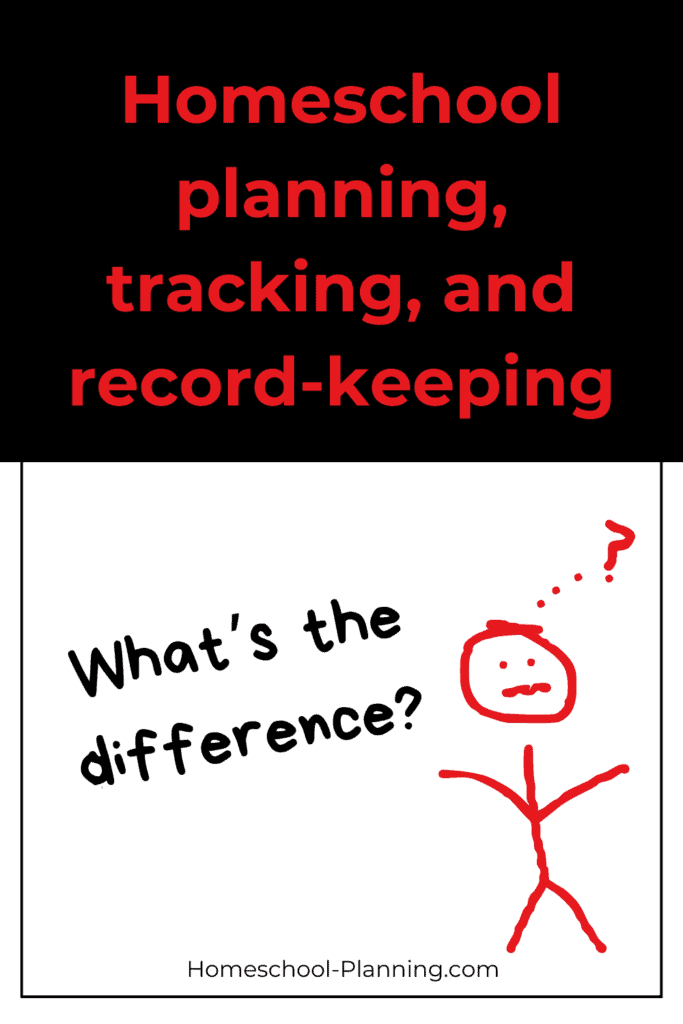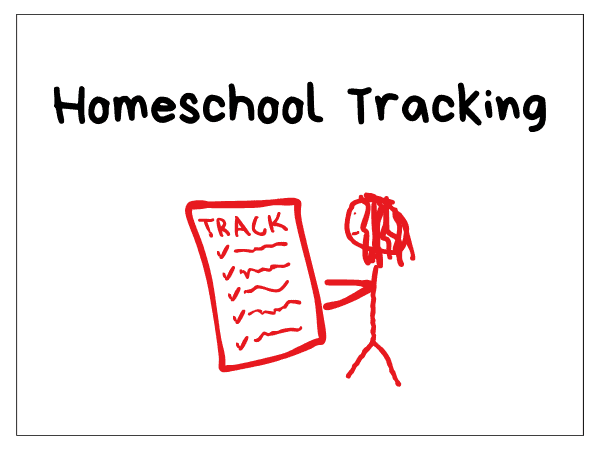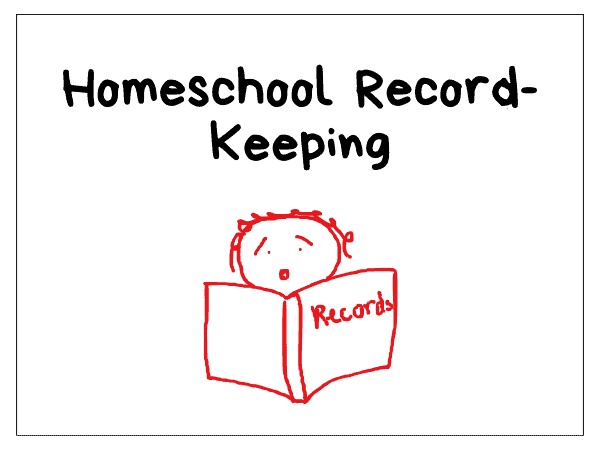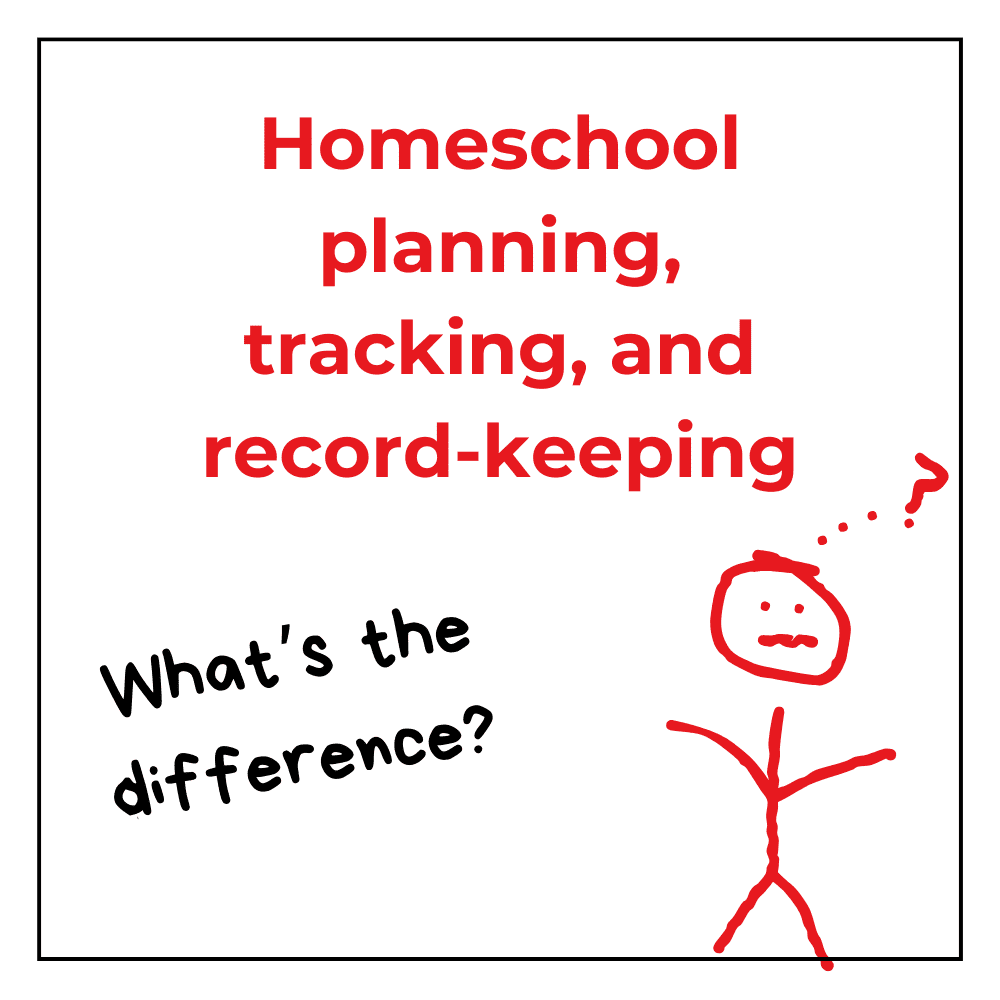Planning, tracking, and record-keeping. Homeschool organization info can sometimes get confusing. You may start searching for record-keeping ideas and all you can find is organization tips. Or you may start trying to plan your homeschool days but eventually discover you’re not planning anything, you’re just tracking. So how do you know what to search for?
So if you’re not sure what the difference is between planning, tracking, and record-keeping, then keep reading. That’s what I’m here trying to clear up a bit today. Hopefully, between my efforts and yours, we can get the word out and get some of this confusion cleared up!

Planning, tracking, and record-keeping
I believe that words matter but it’s easy for definitions to get lost or mushed together over time. Homeschool planning, tracking, and record-keeping are all quite different things, but I have seen many say they are planning when they are tracking. Or thinking they are keeping records without actually keeping much of anything.
You may not think these differences are important. And maybe they’re not. But if you want to talk or learn about a task, it’s important that we are all on the same page as to what that task actually is. And what it is not.
So here are my two cents toward general descriptions of these homeschool organization ideas.

What is homeschool planning?
Homeschool planning in its basic sense is thinking through your year in advance. Getting a plan together for how you will do school with your kids and when. Often homeschool planning includes coming up with your schedules, choosing curriculum, and planning out your day-to-day schoolwork. So when the day comes, you are ready to go and not scrambling to figure out what to do.
Planning can be as simple as knowing you will do 1 full lesson each day of the week Monday through Friday during the typical school year. Or it can be more detailed with a year-round schedule with occasional planned breaks, with certain books and lessons planned to take place on certain days. Both are great plans if they serve you well.
Sometimes the term homeschool planning is used in a more broad sense in the same way as homeschool organization. But just with the books, schedules, and records of homeschooling. I use it this way as well in a general sense, as the name of this site is Homeschool Planning, and does not only include articles about planning in advance, but also general organization.
Read: How to create a homeschool plan that works for you
If you are using the word planning in a general way, you could be discussing anything about homeschool organization. If in a more literal and basic way, it is to think through things in advance and come up with a plan of attack.
“If you are a homeschool mom, homeschooling is your job. And all jobs require time and attention. Take homeschooling seriously and don’t be lazy….Homeschool like it’s your job.“
Do I need to come up with a homeschool plan?
In my opinion, yes, everyone should have some sort of homeschool plan! But before you stop reading, understand that it doesn’t need to be super detailed. As I wrote above, it can be as simple as deciding on what curriculum, resources, or general topics to work on throughout your school year. And decide which days to do school.
Read: Create a simple homeschool plan in 7 steps
Even if you are more of an unschooling family, the decisions you make in advance about helping your kids learn are your plans. Deciding you will cook with them, teach them to care for animals, and explore the world. Those are all plans and should not be discounted.
Not all plans must be detailed or even written down. The important part about making plans is that you have some sort of thought and intentionality put into homeschooling your children.
If you are a homeschool mom, it is your job. And all jobs require time and attention. Take homeschooling seriously and don’t be lazy…. Homeschool like it’s your job.
For more info on creating a homeschool plan for your family, check out my post, How to create a homschool plan that works for you.

What is homeschool tracking?
Homeschool tracking is simply keeping track of what you do and when. This is not done in advance, but as the days unfold. Tracking your homeschool days can also help you stay on track with your homeschool plans and set you up for success for easy record-keeping.
I have heard many people talk about how they “plan in reverse” in their homeschool or use “reverse homeschool planning“. The way people usually describe it really isn’t planning at all, but just tracking what you do. True reverse planning is planning out your year with goals in mind. It’s just planning.
Tracking is actually a great way to organize your homeschool and work towards good record-keeping practices, but let’s not fool ourselves into thinking tracking is planning. Let’s call it what it is and say you track your daily schoolwork. Don’t try to cheat the system and make people think you’re doing something you aren’t.
Many homeschool families will use homeschool planners to track what they do in their homeschool. They just write down what they did that day. If it’s already written down because of their advance planning, then tracking would just be checking off what you did and crossing out what you didn’t get to that day.
If you have curriculum that comes with a chart of what to do each day, checking it off each day is tracking school work. The company made the plans and you are tracking what you do.
I make undated lists of what to do each day and my kids check them off as they go. So I make the plans and my kids help me track.
You could even just put today’s date at the top of each page your child does as they do them. That is tracking.
Keeping a record of what days you count as school days is tracking your days. Checking off the day on an attendance sheet or simply writing “school” in your planner works just as well.
“We have been given much freedom as homeschoolers, but with freedom comes responsibility. You need to ensure you are upholding your end of the deal.“
Do I need to track things in my homeschool?
Homeschool tracking is one practice I don’t think is required of every homeschooler. However, it can be quite helpful if you want to ensure you are staying on track with your plans.
It can often seem redundant if you have detailed plans to re-write things, so if you are making thorough homeschool plans, tracking is easy. Just check things off your plans as you do them. No need to plan and track separately.
If you are not tracking your days and what schoolwork is actually done, it can be difficult to keep good homeschool records. Did you actually complete the amount of days you should? Did you read this book or that one? How much of that curriculum did we finish?
For some, this may not seem like a problem. But if you are an honest person, and I hope you are, it is important to be truthful and take this homeschooling thing seriously. We have been given much freedom as homeschoolers, but with freedom comes responsibility. You need to ensure you are upholding your end of the deal.

What is homeschool record-keeping?
Homeschool record-keeping is the documents and records you keep that prove you are homeschooling your children. This includes days/hours you did school, what subjects you covered, books read, curriculum used, samples of work, and anything else you may want to keep. You also may be required to keep or even turn in many of these records to your local school district.
If you have been tracking your days and grades as you go, then record-keeping will be pretty simple. Just gather all that info together. Then file reports and store as desired. If you have not been tracking things as you go, it will take a little more effort to gather the needed information, but not impossible.
If you google homeschool record-keeping, you will likely find all sorts of fancy and complicated systems to keep things organized. Feel free to use them, but understand that nothing has to be complicated. Keep the needed info in one simple spiral notebook or basic spreadsheet throughout the year along with a little pile of sample work done by your child. Then store it in a file folder or tote in your garage. Easy peasy.
“Following homeschool laws help to keep us able to homeschool without even more government oversight.”
Do I need to keep records in my homeschool?
You absolutely do need to keep some sort of records for your homeschool. Records are important for many reasons, including proving you are teaching your kids. If your efforts were challenged, it would be helpful to have records. If you want to put your kids into a traditional school, records are helpful. Not to mention that many US states require you to not only keep records but also turn in reports to them to follow laws.
Following these homeschool laws help to keep us able to homeschool without even more government oversight.
Basic homeschool records can be simple, like just having a record of the days your kids did school, what subjects you covered that year, and a general idea of progress in learning that was made through grades or a written summary. It is also recommended to keep a few samples of work just in case. Then store these for at least 2-3 years if not until your child graduates from high school.

Planning, tracking, and record-keeping
Homeschool planning, tracking, and record-keeping all work hand-in-hand to simplify your homeschool days and records. It may seem like a lot of unnecessary work to some, but it doesn’t have to be complicated, detailed, or difficult. If you do all three, not only will your days be more smooth, but your homeschool records will be thorough and easy to gather.
Now you have a more clear picture of what planning. tracking, and record-keeping in your homeschool is, and what it is not. I hope we can now carry on with clarity as we continue this homeschool journey. May your planning be inspired, your tracking simple, and your records complete.
Related posts
Create a simple homeschool plan in 7 steps










